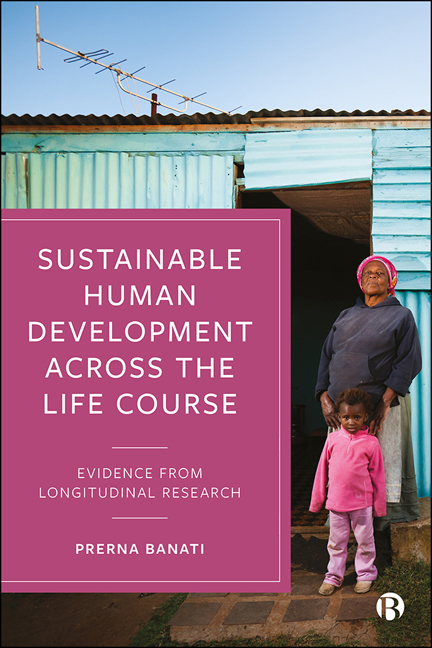Book contents
- Frontmatter
- Dedication
- Dedication
- Contents
- List of Figures, Tables and Boxes
- Notes on Contributors
- Foreword: Understanding and Enhancing Human Development Among Global Youth – On the Unique Value of Developmentally Oriented Longitudinal Research
- Introduction: Measuring Sustainable Human Development Across the Life Course
- 1 Exploring the Potential for Gender Norm Change in Adolescent Girls: Evidence from ‘Real Choices, Real Lives’ Longitudinal, Qualitative Study Data
- 2 Unequal Educational Trajectories: The Case of Ethiopia
- 3 Early Life Transitions Increase the Risk for HIV Infection: Using Latent Class Growth Models to Assess the Effect of Key Life Events on HIV Incidence Among Adolescent Girls in Rural South Africa
- 4 Achieving the Sustainable Development Goals: Evidence from the Longitudinal Parenting Across Cultures Project
- 5 Achieving Gender Equality: Understanding Gender Equality and Health Among Vulnerable Adolescents in the Sustainable Development Goals Era
- 6 Capturing the Complexities of Adolescent Transitions Through a Mixed Methods Longitudinal Research Design
- 7 Child Well-being Across the Life Course: What Do We Know, What Should We Know?
- 8 Mauritian Joint Child Health Project: A Multigenerational Family Study Emerging from a Prospective Birth Cohort Study: Initial Alcohol-related Outcomes in the Offspring Generation
- Conclusion: The Future of Longitudinal Research
- Index
8 - Mauritian Joint Child Health Project: A Multigenerational Family Study Emerging from a Prospective Birth Cohort Study: Initial Alcohol-related Outcomes in the Offspring Generation
Published online by Cambridge University Press: 05 January 2022
- Frontmatter
- Dedication
- Dedication
- Contents
- List of Figures, Tables and Boxes
- Notes on Contributors
- Foreword: Understanding and Enhancing Human Development Among Global Youth – On the Unique Value of Developmentally Oriented Longitudinal Research
- Introduction: Measuring Sustainable Human Development Across the Life Course
- 1 Exploring the Potential for Gender Norm Change in Adolescent Girls: Evidence from ‘Real Choices, Real Lives’ Longitudinal, Qualitative Study Data
- 2 Unequal Educational Trajectories: The Case of Ethiopia
- 3 Early Life Transitions Increase the Risk for HIV Infection: Using Latent Class Growth Models to Assess the Effect of Key Life Events on HIV Incidence Among Adolescent Girls in Rural South Africa
- 4 Achieving the Sustainable Development Goals: Evidence from the Longitudinal Parenting Across Cultures Project
- 5 Achieving Gender Equality: Understanding Gender Equality and Health Among Vulnerable Adolescents in the Sustainable Development Goals Era
- 6 Capturing the Complexities of Adolescent Transitions Through a Mixed Methods Longitudinal Research Design
- 7 Child Well-being Across the Life Course: What Do We Know, What Should We Know?
- 8 Mauritian Joint Child Health Project: A Multigenerational Family Study Emerging from a Prospective Birth Cohort Study: Initial Alcohol-related Outcomes in the Offspring Generation
- Conclusion: The Future of Longitudinal Research
- Index
Summary
Introduction
In their ‘Key Findings on Families, Family Policy and the Sustainable Development Goals: Synthesis Report’, UNICEF (2018, p 5) recognized the family unit as the ‘natural and elementary social unit of all modern society’ and a key to understanding social progress and development that the UN's Sustainable Development Goals (SDG) seek to address. The family unit, while appreciated, often is not prioritized in development efforts. The UN Secretary General acknowledged that the contribution of families continues to be largely overlooked, and that ‘policy focusing on improving the well-being of families is certain to benefit development’ (United Nations, 2010). At the global level, there is a need for more research on the family, with the recognition that family policy requires adaptation to the different contexts and countries in which it will be implemented.
This study seeks to contribute to this research literature on family and its role in health behaviour by focusing on alcohol involvement in two generations of the Joint Child Health Project (JCHP), a longitudinal birth cohort study on the East African island nation of Mauritius. This research relates to SDG 3 on improving health and well-being, including via prevention and treatment of substance use (SDG 3.5) and harmful use of alcohol (SDG 3.5.2). The work serves to exemplify how a prospective child health study can be utilized to examine risk relationships within the family unit to better understand each child's risky health behaviour. The unique combination of the JCHP study features, including the multigenerational longitudinal design, cultural setting and inclusion of families that largely remain intact, increases the potential for this study to contribute to our understanding of development of alcohol involvement (and mental health more broadly) within families. The goals are to report initial findings on rates of alcohol use and heavy use in the JCHP offspring (aged 13–24), and to examine how maternal and paternal alcohol-specific factors are linked to offspring alcohol use and heavy use, which may be gender-specific.
To provide appropriate background and context for this study, first the literature on social development models, transmission of alcohol behaviours within families and gender-specific transmission within families is reviewed, noting that most of this research has been conducted in Western societies.
- Type
- Chapter
- Information
- Sustainable Human Development across the Life CourseEvidence from Longitudinal Research, pp. 193 - 232Publisher: Bristol University PressPrint publication year: 2021



